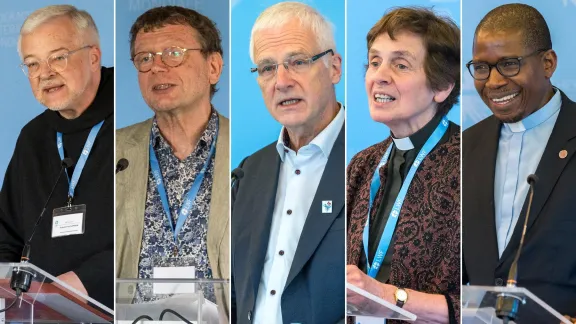
Leaders of global church bodies greeting the LWF at its Council meeting expressed hope and commitment for continued collaboration in dialogues, shared witness and service to the world. Photo: LWF/Albin Hillert
Leaders of global church bodies bring greetings to the LWF Council
(LWI) – Greetings from global Christian leaders to The Lutheran World Federation (LWF) Council at its first full meeting, 13-18 June, near Geneva, expressed hope and commitment for continued cooperation in ecumenical dialogue and shared witness and service to the world.
In a year marking the 25th anniversary since the signing of the Joint Declaration on the Doctrine of Justification (JDDJ), the Catholic representative at the LWF governing body called for continued persistence of “our proven theological dialogue” and “trust that something will grow and mature in the community of hope that will surpass all our hopes.”
The 2024 anniversary of the JDDJ could become a “festival of hope" for churches of all partners of the historic agreement worldwide, said Pater Augustinus Sander of the Vatican’s Dicastery for Promoting Christian Unity (DPCU). The LWF and Catholic Church signed the JDDJ in October 1999. Methodists, Anglicans and the Reformed endorsed it later, affirming a differentiated consensus on the understanding of justification by faith alone, one of the key theological conflicts of the Reformation.
“Who would have dared to hope?” Sander repeated, as he recalled milestones of the nearly six decades of dialogue between Lutherans and Catholics, including the 2016 Joint Commemoration of the Reformation. The ecumenical pioneers who “saw more than just division” and combined faith with a larger and broader perspective, still exist today, he emphasized.
Common witness and service
The LWF Council theme “Abound in Hope,” is an invaluable reminder of “the call to serve in Christ’s name” when many parts of the world appear “to be desperately short of hope and good news,” the Anglican Communion Secretary General Bishop Anthony Poggo stated. He commended the Anglican-Lutheran International Commission on Unity and Mission for actively fostering friendship and shared mission between the two communions. The communion's greetings were presented by Rev. Canon Dr Daphne Green, Anglican Holy Trinity Church, Geneva.
“Hope has always been a daring exercise,” said Rev. Dr Hans Lessing, greeting the LWF Council on behalf of the World Communion of Reformed Churches (WCRC) Interim General Secretary Rev. Dr Setri Nyomi. Referring to the 2017 Wittenberg Witness on continued cooperation in the JDDJ process, Nyomi welcomed the planned consultations on baptism by the five communions. Other levels of LWF-WCRC collaboration such as the NIFEA project on economic justice and a draft statement on the Freedom of Religion or Belief promote “mutual cross-fertilization by sharing the resources of our different traditions and hope for new steps of growing together,” he added.
Greetings from the Ecumenical Patriarchate equated hope to “the reality that our churches have been experiencing” in the past 40 years of continuous theological dialogue under the Lutheran-Orthodox Joint Commission. “The hope for a better and broader understanding of the content of our Christian faith.”
Referring to two joint statements that the LWF Council received from the Commission: on the Holy Spirit and on the issue of Filioque (a clause added to the Nicene Creed in Western Christianity), His Eminence Metropolitan Prof. Dr Kyrillos of Krini asked for prayers for the new dialogue phase on the concept of synodality. “The Church in herself is a Council, established by Christ and guided by the Holy Spirit.” His Eminence continued, “Our preoccupation with the First Council of Nicaea is not a matter of the past, inasmuch as the “spirit of Nicaea” represents the dimension of depth in ecclesiastical affairs.”
The joint statements, His Eminence noted, are “a minimal contribution” to the 1,700 anniversary of the First Council of Nicaea in 2025. LWF Assistant General Secretary for Ecumenical Relations Prof. Dr Dirk Lange read the greeting.
Faith-inspired work
The Pentecostal World Fellowship conveyed enthusiasm for the LWF Council theme, and anticipation for the next round of the Lutheran-Pentecostal dialogue on worship and formation. In greetings delivered by Dr Jean-Daniel Plüss, President of the Swiss Global Christian Forum Foundation, the Pentecostals pointed to the good reception of the 2016–2022 joint statement “The Spirit of the Lord Is Upon Me," saying it signaled strong interest in the dialogue. “We know that this journey strengthens our faith in Christ” and “allows us to find ways of common witness.”
Plüss also presented greetings on behalf of the Global Christian Forum (GCF), which expressed gratitude for the “committed participation of Lutherans all over the world” in its global gatherings including the April 2024 event in Accra, Ghana. Acknowledging Lutheran contribution at other levels such as education and coordinating reception of Ukrainian refugees in Poland, the GCF encouraged similar engagement in a Christian Forum for the German speaking churches in Switzerland in October.
The presence, participation, and sharing with ecumenical guests and the messages received deepened our hope and our sense of unity in the one Body of Christ.
LWF Assistant General Secretary for Ecumenical Relations Prof. Dr Dirk Lange
The World Council of Churches (WCC) General Secretary Rev. Prof. Jerry Pillay affirmed the importance of hope amidst global crises, and commended the LWF for the intense focus on inter-church dialogue, theological education, humanitarian relief, international advocacy, gender justice and peace-making. It is through the faith-inspired work of the LWF in collaboration with its member churches and partners like us in the WCC, “that we can justifiably claim hope.” The greetings were presented by Rev. Dr Kenneth Mtata, Program Director for Public Witness and Diakonia.
“The joy and appreciation evoked by the ecumenical greetings resonated throughout the LWF Council meeting,” noted Prof. Lange. “The presence, participation, and sharing with ecumenical guests and the messages received deepened our hope and our sense of unity in the one Body of Christ.”


